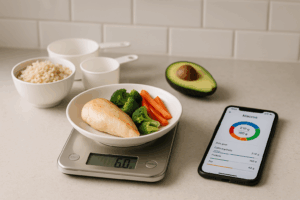Maintaining a healthy weight is deeply connected to the foods we eat, our hydration habits, and overall lifestyle choices. This article delves into the important roles that healthy food and sufficient water intake play in supporting weight loss, offering science-backed insights and actionable strategies to help you achieve your fitness goals while feeling energized and nourished.
Understanding the Relationship Between Food and Weight Loss
Food choices profoundly affect weight management, as nutritional science demonstrates the distinction between nutrient-dense and calorie-dense foods. Nutrient-dense foods—such as vegetables, fruits, whole grains, and lean proteins—offer essential vitamins and minerals with fewer calories, while calorie-dense options provide more energy but little nutrition. Balancing macronutrients is key; protein supports satiety and muscle maintenance, healthy fats aid hormone balance, and complex carbohydrates deliver sustained energy. Strategic meal planning, prioritizing whole foods over processed products, helps regulate hunger hormones and prevents overeating. As noted on Wikipedia, diets rich in natural, whole foods are linked to healthier metabolism and decreased obesity rates.
The Critical Role of Water in a Healthy Diet
Water plays a pivotal role in weight loss by supporting various physiological processes essential for effective fat reduction. Adequate hydration regulates appetite, as the body sometimes misinterprets thirst as hunger, leading to unnecessary snacking. Clinical studies show that drinking water before meals can decrease calorie intake, thanks to a sensation of fullness. Furthermore, water optimizes digestion by aiding nutrient absorption and waste removal, promoting a more efficient metabolism. Staying hydrated also facilitates the mobilization and oxidation of fat stores, which enhances fat-burning. Water complements nutrient-rich foods, creating an environment in which the body burns calories more efficiently and sustains weight management efforts.
Combining Healthy Food and Hydration for Sustainable Results
Pairing healthy foods with consistent hydration amplifies weight loss efforts by creating a steady foundation for energy and appetite regulation. Focus on meal prepping with whole, fiber-rich choices such as vegetables, legumes, and whole grains—these keep you satiated longer and reduce the urge to snack. Incorporate colorful fruits and lean proteins for essential nutrients, planning meals ahead to avoid unhealthy temptations. Hydrate intentionally by drinking water before, during, and between meals to support digestion and manage hunger cues. This synergy helps reduce cravings, fuels your metabolism, and aids in preserving lean body mass for sustainable weight management.
Behavioral Tips and Motivation to Stay on Track
Incorporating behavioral strategies can make healthy eating and hydration truly sustainable. Mindful eating, like focusing on each bite and recognizing fullness cues, reduces mindless snacking. Setting specific, realistic goals—such as eating vegetables at every meal or drinking a glass of water before eating—adds structure and a sense of achievement. Tracking food and water intake through journals or apps highlights progress and reveals improvement areas. Enlisting friends or family creates accountability and encouragement, while celebrating small milestones keeps motivation high. Embracing setbacks as learning opportunities, rather than failures, fosters resilience and helps maintain momentum on the weight-loss journey.
Conclusions
Adopting a lifestyle centered on healthy food choices and proper hydration forms a solid foundation for effective and lasting weight loss. By understanding how these elements work together and applying practical strategies, you can boost your well-being while achieving your weight goals. Stay motivated, make informed choices, and remember that small, consistent steps yield lasting results.





